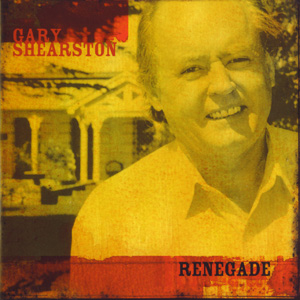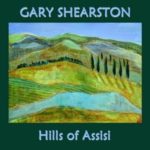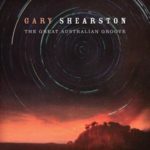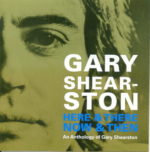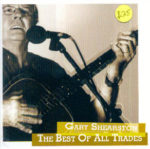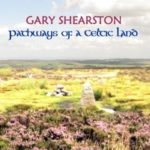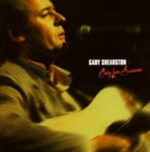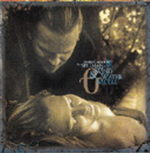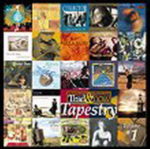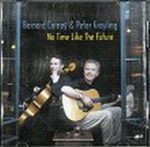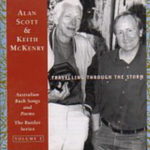Description
Gary Shearston has been a major influence on Australian music for some five decades. In a society where we are conditioned to take music for granted, as yet another dismissible commodity, Gary’s music has stood the biggest test of all – the test of time.
“Gary Shearston is the closest Australia has ever come to producing a local version of Bob Dylan” (Bruce Elder, SMH). Not only was he an influential singer of traditional folk songs during the 1960s heyday of the folk boom & one of the few determined to sing our own songs – about shearers, drovers and other bushmen with a natural bush voice when other Australians were singing with broad Irish accents, sounding like frisky sailors or cotton pickers on the Mississippi, but he was also a hugely gifted songwriter, a radical re-interpreter of the folk tradition (who else thought of using reggae as a backing for Australian songs as early as 1974?) and, if you need any further evidence, had he not been banned from travelling to the United States due to his involvement in the anti-Vietnam movement, he would have ended up being managed by Dylan’s manager, Albert Grossman.
Grossman invited Shearston to go to the States. US Immigration locked him out. So Shearston ended up in London in the early 1970s where, signed to Charisma Records (famous for a catalogue which included Genesis and Van Der Graaf Generator) he scored a hit with an unadorned version of Cole Porter’s ‘I Get a Kick Out of You’.
He eventually moved back to Australia to raise his family and later to commit himself to his beliefs and church. Throughout all these travels, both physical and spiritual, Gary has continued to create new songs and revisit his old ones. He still travels that same road as a singer, songwriter, free thinker and music stylist.
For those who have been living in a parallel universe (or watching CMC); and are inexplicably ignorant of Shearston’s career, a little backtracking may be in order.
Gary Shearston was raised in Tenterfield, NSW. When he was 12 years of age his family moved to Sydney where, after leaving school, he went on to work as a journalist. His childhood experience of life in the bush, however, would develop as one of the dominant influences in his writing.
In the late 1950s, at a time when most Australian Folk Singers were performing their repertoires in unnaturally broad Irish accents; when Rock‘n Roll and Country Singers mimicked a ridiculously ‘Overblown Texan Tone’ and when even many of The Bush Balladeers in Country Music were trying to sound more like ‘The Singing Brakeman’ than Australian Bushmen, Gary pioneered a style that somehow managed to drag the Australian Accent, kicking and screaming, into the light of popular music.
It is no exaggeration to say that without his influence the musical culture which spawned and supported the rise of The Bushwackers, Redgum and John Williamson would probably never have existed.
By 1962 Gary was living in Kings Cross and had fallen under the influence of The Sydney Bush Music Club. He was already performing Australian classics, in between his more accessible material, when the ‘folk boom’ of the early 1960’s hit.
Many people in Folk and Country Music (who regularly sing them now) are often unaware of how close to oblivion, songs such as the Rybuck Shearer and Lachlan Tigers actually came. A great debt is owed to the efforts of archivists and historians such as A.L. Lloyd, Duke Triton, Edgar Waters and Eric Watson, who collected and preserved Australia’s Musical Heritage.
Shearston quickly became a regular performer on TV and in Sydney Clubs, and was invited to open The Troubadour Folk Club at the insistence of Brother John Sellers, the American Bluesman who was performing here at the time.
By the time Gary was signed to CBS, in 1963, his work as a songwriter had also become increasingly recognised. ‘Australian Broadside’, featuring ‘Sydney Town’, cemented his position as one of Australian Music’s leading voices.
His classic, ‘Sometime Lovin’’ became a world-wide hit when it was recorded by Peter, Paul and Mary on their LP, ‘Album’, in 1965. Like Bob Dylan, John Denver and Gordon Lightfoot, whose careers were also launched when their work was showcased by that iconic folk trio, Shearston’s star was rising rapidly in the international arena.
But there was another side to Gary Shearston, and it was one which would inevitably lead to both his finest moments and his greatest challenges. Gary, who had been raised a Christian; was a committed activist. In addition, he was a man whose belief in the redemptive power of song led him to begin writing material which openly targeted some of the more contentious Inequalities and injustices of the day.
Gary Shearston – Renegade
CD Review by Jim Low
‘Renegade’ is acclaimed Australian singer-songwriter Gary Shearston’s latest CD. We are treated to16 newly-recorded songs.
While listening to the CD a couple of days ago, a kookaburra began a rather raucous, accompanying cackle.
I interpreted this enthusiastic response as an authoritative endorsement of the definitive, Australian sound of the songs and also of their quality.
And with continued listens, I haven’t changed my mind.
I can’t speak for the kookaburra, however!
Unique images from the Australian landscape accompany the simple affirmation in the opening song title to ‘Live in love’.
The songs ‘Truth Is’ and ‘About the Situation’, both set to traditional tunes, provide some interesting background information regarding the path Gary has travelled both musically and in his search for the things he believes in and values.
His skillfully-constructed lyrics recount his side of things.
You don’t pass lightly over images of church leaders likened to “sideshow alley spielers”.
These songs also help to explain the CD title.
‘His Name Was Edgar Waters’ is set to the traditional tune used for the song ‘My Name is Edward Kelly’.
Gary sang the Kelly song on the LP ‘Bolters, Bushrangers and Duffers’ which was released in late 1965.
The very comprehensive notes for this record were written by Waters.
Waters also wrote the album notes for another two of Gary’s early CBS recordings, ‘Australian Broadside’ and ‘The Springtime It Brings on the Shearing’.
Gary’s song about his friend is a fitting acknowledgment of the important role Edgar Waters played in the revival of Australian folk music and song.
The song ‘Paint Me A Painting, Painter’ is another dedication to a friend, the Sydney artist Martin Sharp.
It celebrates both the creative process and friendship.
The simple detail in the descriptions of Sharp at work reinforces Gary’s admiration for, and the value placed on his friend’s creative output.
The tune that accompanies this song is a good example of Gary’s ability to compose a strong, memorable melody.
The title song ‘Renegade’ concludes the CD.
If Gary regards himself as a renegade, it’s probably because he has always been ready to stand up and say what he believes, despite the consequences.
As he declares in the chorus of this song:
“I’m still ready willing and able
To lay all my cards on the table
And call a spade a spade.”
He has already confessed the following in ‘Truth Is.’
“I just celebrated, as conscience dictated,
Good causes I could help with a song.”
There is no evidence that I can see in any of the songs, of nostalgia for a world now passed, as one reviewer recently claimed.
There are songs that engage and encourage us to value good memories, try and understand the past and possibly learn from the mistakes of the past.
These are the “seeds” spoken about in the opening track, the wisdom that comes from a lifetime of experience.
The musical arrangements differ from the more sparsely-sounding ‘The Best of All Trades’, Gary’s last double CD release.
In ‘Renegade’, you will hear the drumming talents of Gary’s son Luke, on every track.
Roger Ilott sensitively plays a wide selection of electric and acoustic-stringed instruments as well as keyboards.
Lee Williams contributes bass guitar on all tracks and tasteful electric and acoustic guitar on three.
Penny Davies and Roger Ilott enhance a number of the songs with backing vocals, while their son Jordan plays dobro on a song.
The rich sound created by all these capable musicians gives an edge to many of the songs.
Thankfully at no time does the instrumentation drown out Gary’s strong and, for many of us, pleasantly familiar vocals.
Let’s hope that Gary Shearston continues to write and sing his songs and “keep tabs on all the wrongs” for many years to come.
Congratulations to Rouseabout Records for their continuing support of fine Australian music.
CD review by Ian Dearden
The word “legend” is used freely in the music world, but few could be more entitled to its use than Gary Shearston.
With a career that stretches back to late 1950s Sydney, Gary rode the crest of the folk revival from the early 1960s on, both as a songwriter, and as one of the leading lights in recording and performing Australian traditional bush music.
He continues to be a talented songwriter, and on Renegade, recorded in Stanthorpe in 2010, it is clear that the flame which has burnt for more than 50 years, still burns strong.
For a man who has devoted so much of his life to music, with diversions along the way, some of which he sings about (including a significant period in the Anglican priesthood), Gary still has much to say, and is not afraid to say it, in song.
The 16 songs on this collection, superbly recorded by Roger Ilott at his Restless Music studio, find Gary Shearston, the songwriter, ranging over a wide variety of topics.
The album opens with a song which reflects a life of joy, pain, and love in a uniquely Australian landscape (Live in Love). Then we move to songs which reflect a life in conflict with a conservative body politic (Truth Is, Hey Little Lassie), songs which celebrate great Australians (Paint Me A Painting, Painter, His Name Was Edgar Waters), and a song which sums up Aussies and their capacity to praise in a myriad of different ways (She’s a Classic). It is, however, the final (title) song, Renegade, which best sums up a lifetime of personal and artistic struggle and the hope that survives above all.
Throughout the album, we hear the “voice” of a legend who readily acknowledges his flaws and frailties, but has never lost his faith in music and those (including himself) who sing and play it.
Gary hasn’t made this album alone – in addition to his talents as a recording engineer, multiinstrumentalist Roger Ilott contributes superb electric guitar playing that underpins the entire album, as well as keyboards, mandolin, banjo, pedal steel and acoustic guitar ..oh, and backing vocals.
The gorgeous voice of Penny Davies also lifts a number of the tracks, while the rock solid rhythm section of Lee Williams (bass) and Luke Shearston (drums) keeps the whole album firmly anchored in time (and space!)
Yes, here’s living proof you can reach your seventies (sorry Gary, Wikipedia says so, so it must be true), spend your entire adult life in music, and still have a voice, something to say, and the determination to say (or rather, sing) it!
Get your hands on this album and find out for yourself!
